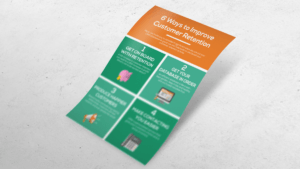Dealing with Angry Customers in Field Service: 10 Tips
March 12, 2025 | Read: 8 minutes

When dealing with an angry customer, if left unresolved, the consequences can have a ripple effect that extends far beyond a single interaction, potentially damaging your business’s reputation and impacting future sales.
In the dynamic environment of field service, these situations can arise frequently due to the nature of on-site work and the potential for unforeseen issues.
It’s not simply a matter of reacting to angry customers; it’s about proactively implementing strategies to prevent and manage these situations effectively.
Of course, things do inevitably go wrong from time to time and you’ll need to handle dealing with angry customers when these situations arise.
No matter how meticulously you plan or how diligently you execute, unforeseen issues, miscommunications, or simply differing expectations can affect customer satisfaction.
In the demanding realm of field services, this challenge is often amplified. With engineers navigating unpredictable environments, managing multiple jobs concurrently, and facing unexpected delays or complications, it’s a delicate balancing act.
This complexity can make it difficult to maintain composure and respond effectively when confronted with a customer’s anger, especially when under pressure to meet tight schedules and resolve problems on the fly. It can also be a challenge when breaking bad news to customers, too.
This underscores the need for clear communication, efficient problem-solving, and a customer-centric approach that prioritises empathy and resolution.
So how exactly should you be dealing with challenging customers?
Below, we’ve taken a look at 10 ways:

1. Prevent customer complaints in the first place
By far the most effective way to preserve your good name is to stop issues arising in the first place.
While we recognise that this is not always possible, there are some key factors that will lead to a reduction in errors.
- Regardless of whether a genuine mistake has been made or if a customer’s perception simply differs from reality, having a comprehensive record of your engineer’s work is essential for ensuring clarity and accountability.
- To ensure everyone involved – your team, your customers, and potentially even third parties – understands precisely what transpired, you should implement robust systems that meticulously track each step of the process.
- This includes utilising photographs to capture visual evidence, maintaining detailed documents and procedures, and securing customer signatures for confirmation of completed tasks.
These thorough systems act as a crucial tool for investigating and resolving issues that may arise. Moreover, they are a powerful deterrent against cutting corners and rushed work, promoting a culture of quality and transparency.
2. Hire the right people
Effectively dealing with angry customers often begins long before a problem arises. A key management skill lies in the strategic allocation of engineers, ensuring that those with the right competencies are assigned to specific tasks.
Customer complaints are far more likely to arise if staff are under-trained or under-experienced for the demands of the job.
By proactively monitoring staff capabilities and providing high-quality professional development, you’re not only enhancing their technical skills but also equipping them with the tools and confidence to handle complex situations and prevent customer dissatisfaction.
This proactive approach to matching competencies to tasks ensures a successful and customer-friendly field service business.
3. Stay calm
It’s a fundamental principle of conflict resolution: escalating anger with anger only fuels the fire. However intense a customer’s frustration might be, and regardless of how aggressive their behavior becomes, responding with your own anger or panicking will only exacerbate the situation and hinder any chance of a productive resolution.
This is often easier said than done, especially when faced with verbal aggression or unreasonable demands. That’s why it’s absolutely essential to equip yourself and your team with a repertoire of anger management strategies.
Having a toolkit of techniques to de-escalate situations, maintain composure, and respond calmly under pressure is invaluable for effectively resolving customer disputes and preserving your professional reputation.
68% of consumers say they are willing to pay more for products and services from a brand that offer great customer service experiences. (HubSpot).
4. Listen to your customers
No matter how many answers you might feel you have to a situation, your angry customer is not going to be placated until they feel that you have listened to and understood their story.
Active listening techniques can help them to appreciate that you are listening to them.
Try to nod or make noises of agreement as they speak, allow them to finish their sentences and once a calmer point is reached try to paraphrase their issues as you understand them.
5. Be mindful of your customer’s needs and feelings
When dealing with angry customers, it’s crucial to remember that anger rarely arises in a vacuum. Even if a customer’s reaction appears disproportionate to the immediate situation, there are likely underlying reasons that fuel their strong emotions.
- Instead of dismissing their anger as irrational, take the time to appreciate the broader context of what has transpired. It may be that your actions have jeopardised an urgent deadline, resulting in significant financial losses or the inability to fulfill promises to their own clients.
- By recognising the potential consequences of the situation, you can demonstrate genuine empathy and understanding.
- However, it’s essential to strike a balance between showing sympathy and maintaining authenticity. Avoid appearing insincere or condescending, as this will only exacerbate the customer’s frustration.
Here’s How to Handle Bad Reviews—And Turn Haters Into Customers!
6. Show customers empathy
True empathy goes beyond simply acknowledging a customer’s frustration; it requires a genuine effort to understand their perspective. This is where taking the time to listen actively and gather the full story becomes crucial.
- Before jumping to conclusions or offering solutions, make a conscious effort to truly understand the situation from the customer’s point of view.
- Try to step into their shoes and imagine yourself in their position. Consider how you would feel, what your expectations would be, and what steps you would need to see taken to rectify the issue.
- This perspective-taking exercise will allow you to connect with the customer on a deeper level and demonstrate genuine empathy.
However, empathy isn’t just about understanding; it’s about conveying that understanding through your actions. Make it clear through concrete steps, not just empty words, that you genuinely recognise and acknowledge what they are going through.
7. Always tell the truth
Lies will always find us out eventually.
If telling the truth about a situation is going to contravene company policy or put someone else in a difficult position, be patient.
If you don’t yet know what the truth is behind what has happened you can explain that you need to gather more information before you pass a comment. This has the added benefit of buying you time and allowing you to do your due diligence.
After all, it can be tempting to react immediately, but patience is a virtue and you’ll find it easier to build trust, too.
8. Remember to smile
If your customer is angry they likely won’t be smiling at you.
This doesn’t mean though that a smile from you won’t go a long way to calming a situation down.
We pick up on non-verbal clues more than we think and a smile when your customer is maybe expecting a retaliatory reaction may well disarm a tricky situation.
9. Offer an apology
When dealing with angry customers, even if you firmly believe your engineers or operatives have acted correctly, a sincere apology can be a powerful tool for de-escalation and building rapport.
It’s not about admitting guilt where none exists, but rather about acknowledging the customer’s frustration and demonstrating your commitment to resolving the issue. If at all possible, offer a general apology about the situation itself, without directly implicating anyone or appearing to contradict the customer’s perspective.
This approach allows you to validate their feelings, diffuse tension, and create a more conducive environment for finding a solution, which is crucial for dealing with angry customers effectively.
10. Take appropriate action
You will be amazed how quickly a resolution can be found if you demonstrate that you are prepared to take action to resolve a situation. 83% of customers agree that they feel more loyal to brands that respond and resolve their complaints. (Khoros)
While escalation is ideally avoided, it’s important to be prepared for a worst case scenario that might be more time-consuming to deal with. Ideally, you don’t want to lose a customer and have it impact your own reputation.
Dealing with Angry Customers and Lend a Helping Hand
If you follow these tips next time you find yourself in a confrontational situation and dealing with angry customers you will almost certainly experience a more pleasant outcome.
While this won’t 100% fix all of your problems, it’s a great starting point.
The more accustomed you get to dealing with these situations, too, the better you’ll be at preventing them as well!
Below, you can check out our Customer Service Cheat Sheet that can help you to deal with customers, every time:

Vanessa Barrett
I'm a Content Marketing Specialist at Commusoft! I am passionate about creating engaging, insightful content that helps field service businesses thrive. My skills include social media & storytelling.








